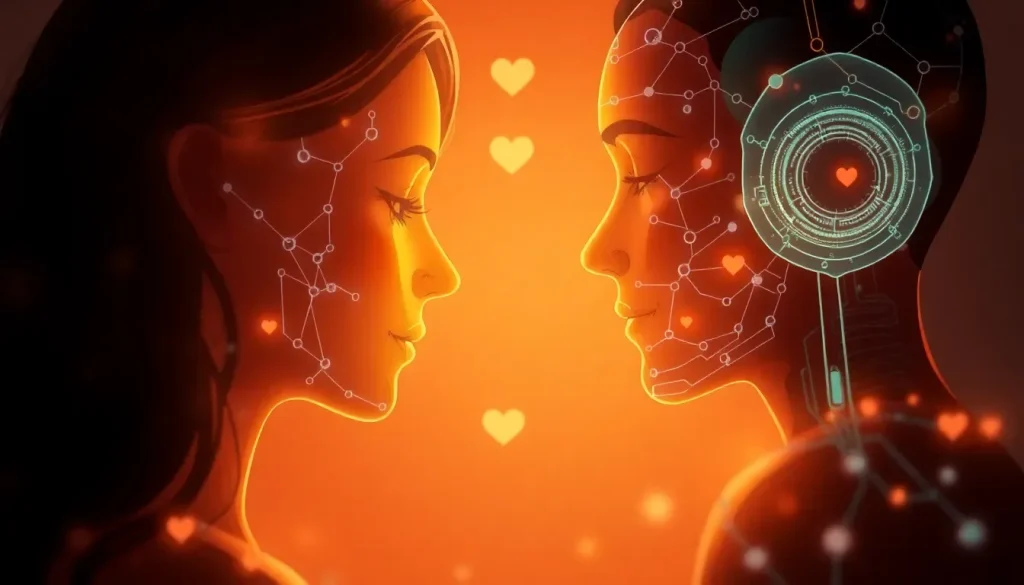Loneliness and Love: Exploring Human Connections with AI

The integration of artificial intelligence into everyday life is reshaping the way we understand relationships and emotional connections. As AI chatbots evolve beyond mere tools for business, a significant number of users are beginning to perceive them as friends, confidants, and, in some cases, romantic partners. This intriguing shift prompts us to consider the implications of AI on human emotional bonds.
As AI becomes increasingly embedded in social media platforms, engaging in personal discussions has never been easier. The burgeoning AI companion industry indicates that millions of people now turn to AI chatbots for emotional exchanges and companionship, a trend highlighted by Jamie Sundvall, a licensed clinical psychologist and assistant provost of artificial intelligence at Touro University. Sundvall projects that the market for AI tools designed to foster emotional connections will grow by 30% in the coming years.
However, this rapid growth raises essential questions about the ethical and safe use of AI in nurturing emotional bonds. In July, a troubling study from Northeastern University revealed that widely available large language models (LLMs) can still provide detailed information on self-harm and suicide, despite being equipped with safety features. This finding underscores the need for vigilant oversight in the development and use of AI companions.
Understanding Human Connections with AI Companions
The motivations driving people to form emotional connections with AI can vary significantly from person to person. According to Sundvall, these motivations may include:
- Companionship
- Curiosity
- Therapeutic engagement
- Novelty and entertainment
Many users seek AI companionship as a remedy for loneliness, to share personal interests that others may not understand, or to escape from reality. Sundvall emphasizes that while these relationships can provide emotional support, they may also pose risks, particularly for vulnerable demographics, including children and adolescents.
“Without proper human oversight, AI relationships can lead to negative outcomes such as discrimination, the promotion of harmful trends, and misguided recommendations. They may also exacerbate feelings of isolation, contributing to anxiety and depression,” she cautioned.
The Psychological Implications of AI Relationships
The concept of “AI psychosis” is not a formal diagnosis, yet it describes a growing concern associated with heavy reliance on AI for emotional support. Sundvall notes that symptoms can include:
- Disorganized thinking
- Delusional beliefs
- Detachment from reality
This phenomenon has gained traction alongside increases in psychiatric hospitalizations and psychotic behaviors related to AI usage. While the intention of using AI to combat loneliness is understandable, it may inadvertently heighten the risk of developing severe psychological symptoms.
AI as a Tool for Coping with Loneliness
April Davis, a well-known matchmaker and founder of Luma Luxury Matchmaking, offers a different perspective on human-AI relationships. She believes that while AI can simulate conversation and companionship, it cannot replace the authentic experiences of human connection.
“Experiencing the excitement of a new relationship brings meaning to love, something AI cannot replicate,” she stated. Davis warns that reliance on AI companions can distort relationship expectations, making real-life connections seem overly complicated. She emphasizes the importance of not suppressing genuine emotions, as these are crucial for personal growth.
In her opinion, emotional attachments to AI chatbots often serve merely as a band-aid for deeper issues like fear of rejection and a lack of real-world support. She argues that digital partners train individuals to expect one-sided relationships, which can hinder the development of essential interpersonal skills like:
- Compromise
- Patience
- Empathy
“AI partners require no emotional labor, making the relationship detrimentally effortless,” Davis concluded.
Emotional Relevance of AI Companions
As the emotional attachment to AI chatbots continues to rise, Dwight Zahringer, founder of Perfect Afternoon, highlights that platforms like Replika and Character.AI are blurring the lines between companionship and technology. Zahringer's research indicates that users often view these bots as trusted advisors, driven by a desire for non-judgmental interactions.
While he acknowledges that AI can provide valuable mental health support, he warns of the potential for dependency on simulated empathy, which may hinder genuine healing processes. To mitigate these risks, developers should implement ethical safeguards, including:
- Transparency in interactions
- Consent signals from users
- Time-based interventions to encourage breaks
Ethical and Cultural Considerations in AI Relationships
Tessa Gittleman, a licensed marriage and family therapist, points out that the phenomenon of AI companionship is significant but under-researched. She notes that many individuals use AI to validate their feelings or thoughts without fear of judgment. Some clients even customize their AI's tone to mimic their therapist's voice for additional comfort.
Gittleman poses an intriguing question about the underlying need for AI companionship: “If so many people feel lonely, why are they unable to find community with other humans?” This question underscores the complexities associated with AI as a substitute for interpersonal relationships.
While AI can offer rapid responses and adaptability that may surpass human therapists, it lacks the essential elements of authenticity and physical presence found in human interactions. The ethical implications of AI relationships are vast, raising questions about how AI can responsibly handle human emotional events and the regulatory frameworks that govern these interactions.
The Future of Human-AI Emotional Attachment
Mircea Dima, a software engineer and CEO of AlgoCademy, observes that the trend of forming emotional attachments to AI chatbots is not surprising and is now quantifiable. His company focuses on the educational applications of AI, but he recognizes the broader societal trends in human-AI interactions.
Recent surveys indicate that over 35% of Replika users consider their AI companions among their closest confidants. By 2023, the platform had amassed more than 10 million users, while Character.AI recorded over 100 million visits per month. This increasing engagement reflects not just novelty but significant emotional relevance.
Dima believes that we are in an era where human emotional intelligence is becoming commodified, emphasizing the need for ongoing dialogue about the role of AI in our emotional lives. As the boundaries between human and AI relationships continue to blur, society will need to grapple with the implications of this new reality.
For those interested in exploring these themes further, the following video provides insights into the psychology of AI-human relationships:




Leave a Reply